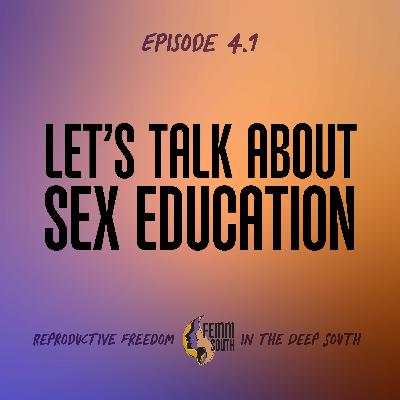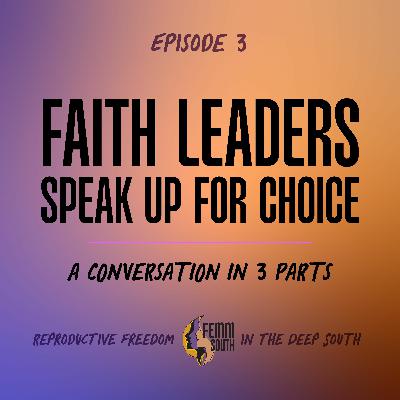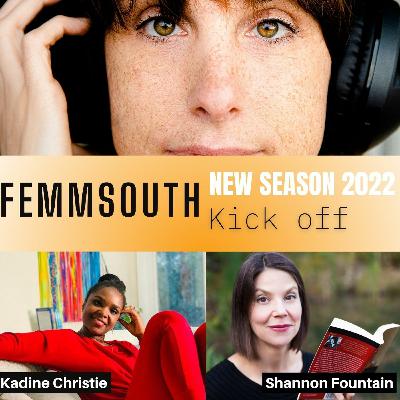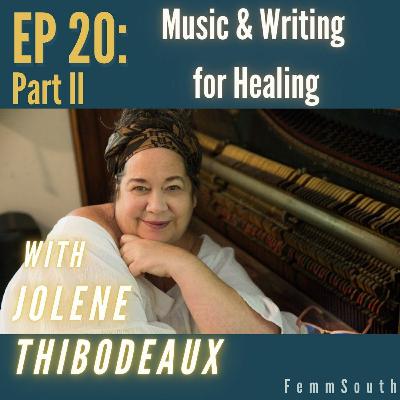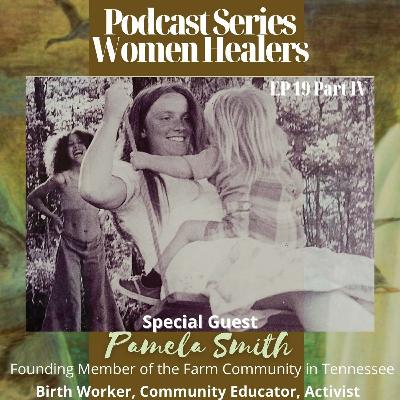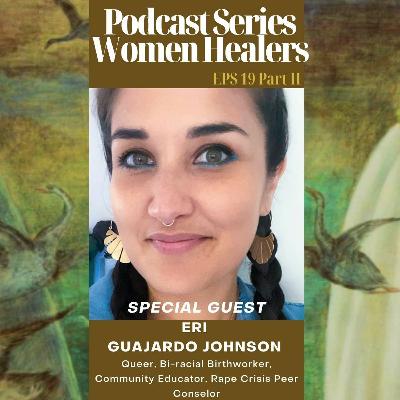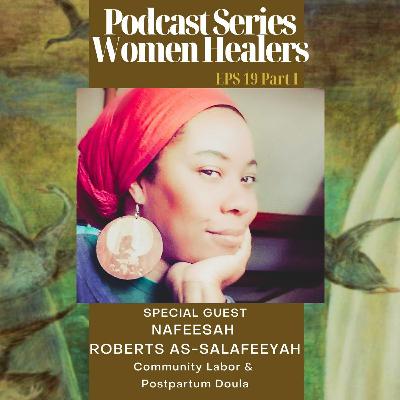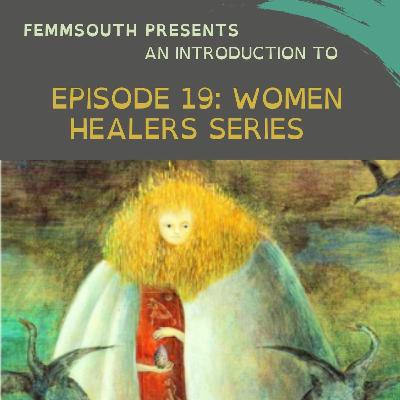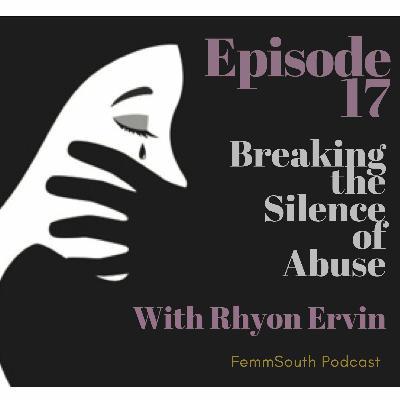Discover FemmSouth
FemmSouth

FemmSouth
Author: FemmSouth: Speaking up for Women's Rights in the South
Subscribed: 13Played: 121Subscribe
Share
© All rights reserved
Description
At FemmSouth we have a mission.
We believe that through feminist theory, through a comprehensive study of women's history, and through current dialogue women can transform and heal.
We seek to demystify the feminist movement, with grass-roots, community building and local empowering efforts.
We aim to give voice to Southern women in unifying and connecting all sides of the global women's movement.
We believe that through feminist theory, through a comprehensive study of women's history, and through current dialogue women can transform and heal.
We seek to demystify the feminist movement, with grass-roots, community building and local empowering efforts.
We aim to give voice to Southern women in unifying and connecting all sides of the global women's movement.
50 Episodes
Reverse
In this podcast episode, Leigh, Lindsay, and Mette welcome guests Lauren and Jasmine, members of the Pensacola Abortion Rights Task Force (PART), to discuss Pensacola's history with abortion care and activism, as well as Florida's current Amendment 4 initiative. PART was founded in 2022 in response to the Dobbs decision that overturned Roe v. Wade and the closure of the local family planning clinic. The organization is actively involved in petitioning efforts for Yes on 4, a non-partisan, citizen-led ballot amendment set for a vote this November. This amendment protects abortion access up to viability and secures the right for individuals and physicians—not politicians—to make personal decisions about reproductive care. It has garnered nearly a million signatures, emphasizing strong public support across party lines. The amendment now requires a 61% approval rating to pass, which is higher than similar measures in other states.
We also discuss Lauren's documentary "Pensacola Struggle for Abortion Rights," which outlines the historical context of Pensacola's fight for reproductive rights over the past 50 years. This struggle has endured decades of violence from extreme anti-abortion activists, including the first killing of an abortion doctor in 1993, which garnered national attention and inspired the Rock for Choice concert in Pensacola by Pearl Jam and L7 the following year. The clinic that experienced this violence operated for nearly 50 years before its closure in 2022, serving as a critical resource for those seeking abortion care in the region. Lauren's documentary, which premiered for Women's History month, aims to connect current activists with the stories of those who fought for these rights in the past.
For our comprehensive show notes and resources for how to get involved, use the following link—https://docs.google.com/document/d/1GaFb9TG1FteiW-hJ8r-02UVNeufaK3E6ANr0RQ6TdNE/edit?tab=t.0#heading=h.fx116pkqr7g
In this gripping episode, we delve into the heart of the battle for intellectual freedom with Angie Hayden, the visionary founder of Read Freely Alabama, and Elizabeth Williams, a passionate member of FemmSouth and organizer for Read Freely Alabama's Baldwin County chapter. Join us as Angie sheds light on the harrowing frontlines in Alabama, where the public library in Prattville stands as ground zero. Amidst the fallout from clashes with right-wing groups, Angie reveals the shocking dismissal of four dedicated library workers and the replacement of key positions with members of Clean Up Alabama and their allies. We also uncover the latest developments in Fairhope, Alabama, where groups like Moms For Liberty are pushing for a statewide implementation of Prattville's restrictive policies, limiting access to vital literature for young readers. Despite the challenges, Elizabeth shares inspiring accounts of Fairhope's resilient community rallying together to defend LGBTQ+ representation in their library and safeguard the livelihoods of their cherished librarians. Tune in as we explore the ongoing struggle to preserve freedom of expression in the heart of the Deep South.
In this episode, Lindsay, Mette, and Leigh meet with two guests from the Alabama Campaign for Adolescent Sexual Health (ACASH) to hear how the the overturn of Roe continues to shape Sex Education policy in Alabama.
Christina Clark Okarmus, the Executive Director of ACASH, and ShaKaya Darrington, member of the Youth Advocacy Group, explain how sex education is a critical component to Reproductive Justice as children and teens deserve age appropriate, medically accurate, comprehensive education about their bodies, how to recognize sexual abuse, how to prevent unwanted sexual advances, how to negotiate safe sex, how to prevent unwanted pregnancies, sexually transmitted diseases, and a host of important information that can save their lives.
We discuss the history of sex education in Alabama, and the current attempt by Alabama lawmakers to require an “abstinence only until marriage” policy as the only safe option while also prohibiting demonstrations or conversations around contraception. Once again Alabama lawmakers are ignoring expert data that proves just what parents want for their kids and what students need. They are ignoring data and expert medical opinions that prove abstinence only policies are ineffective. They particularly ignore students that have been forced into early sexual encounters against their will, and instead espouse the unrealistic idea that marriage will somehow protect them.
Parents and experts agree that our kids deserve better.
Episode 3.3 “Faith Leaders Speak Up for Choice” with Rev. Ginny Phillips Allen and Rev. Renee Adcock.
In this session, you will hear our conversations with two local faith leaders talking about abortion rights in lower Alabama. If you attended a protest following the overturn of Roe v. Wade in either Mobile or Fairhope, you likely saw Rev. Ginny Phillips Allen in her clerical collar standing on the streets and even being asked to speak on the steps of the Courthouse in downtown Mobile. She shares her journey from growing up as the daughter of conservative Baptist minister to taking a progressive, faith-based stance and being vocal on this issue in our community.
We also hear from Rev. Renee Adcock, who recently founded a new spiritual center in Baldwin county, Spiritual Awakening Center 360, to hear how she has these conversations with her community. One point that she makes that I particularly love is that abortion is not a church or government matter, and one cannot use a spiritual text that is irrelevant to so many people to determine law for our country. Coming from a faith leader, this is an important distinction to make. She also talks about the spiritual leader's role in supporting people in their choices, whatever they may be. When asked about what gives her hope, Renee looks to this next generation of young people who are caring, inclusive, and willing to stand up for change.
With these three episodes, we offer hope and supportive resources—if you are in a congregation where your faith leader is not publically or privately supportive of reproductive choice, or if you are a faith leader that feels silenced or ill-equipped, then you may find the resources in our EP 3 show notes helpful for making change in your spiritual community. Every single one of our guests have offered their support, so we hope that you will reach out and connect with them.
And here is a link to our show notes—https://docs.google.com/document/d/1hWiVCJ9kIZvDBAdS8X9G-NZQ84VaUSThybpyLRiR3HM/edit#heading=h.fx116pkqr7g
In this second segment we talk with Rev. Latishia James, an ordained minister in The Fellowship of Affirming Ministries, and the Co-Director of Spiritual Alliance of Communities for Reproductive Dignity (also known as SACReD) where they advance reproductive justice for marginalized communities through congregations and spiritual communities grounded in a progressive moral framework. Latishia is a Black queer femme, womanist, writer, and facilitator of healing spaces for BIPOC women, femmes, and LGBTQIA folks.
Latishia opens this episode by sharing her calling to reproductive justice through several pivotal experiences—her mother’s battle with AIDS, her queer identity in a Pentecostal upbringing, and her time working in an HIV/AIDS organization that supports women and girls of color. Latishia walks us through the history of the religious right’s anti-abortion movement as well as the inseparable link between reproductive justice and racial reconciliation. We dive deep into questions about what it means to approach reproductive justice from a decolonized, anti-patriarchal lens.
Also the founder of Pleasure Principles Consulting, a healing-centered, coaching practice for people harmed by religious rhetoric and patriarchal violence, Latishia talks about her healing work with women and gender expansive people who have experienced trauma and internalized shame because of the false schism between sexuality and spirituality—
“Separation is mental. The separation comes from these systems of oppression that have convinced us that there is a separation, but the separation actually never existed. So, it is a remembering of our wholeness and that we have the authority to live into our divine beings” (Rev James).
We hope you will be inspired to check out SACReD’s website. You can sign up to learn about SACReD’s curriculum for congregations and spiritual communities to begin the work of justice-oriented, spiritually-based work around reproductive issues. You can also sign up for any one of their upcoming facilitator training sessions in Nov & Dec to learn how to lead a congregation, education class, small group, or other community through their intentional curriculum.
And here is a link to our show notes—https://docs.google.com/document/d/1hWiVCJ9kIZvDBAdS8X9G-NZQ84VaUSThybpyLRiR3HM/edit#heading=h.fx116pkqr7g
Across three segments—all guided by ordained faith leaders—we’ll shine a light on the patriarchal systems and colonialist histories that lead to trauma, abuse, and violations of the autonomy of pregnant people. We explore the supposed schism between spirituality and sexuality. And we discuss the role of clergy and share resources and advocacy tools for both clergy and members of faith communities.
In our first segment, we talk with Rev. Katey Zeh about her call to reproductive justice in seminary as a volunteer supporting people through their experiences at an abortion clinic. She opens up about her struggles with her own abortion stigma, as well as the political origins of the anti-abortion movement, the moral high ground that anti-choice groups falsely claim, and the harm caused by fake clinics. She also shares her work with RCRC supporting clergy to better serve pregnant people in their communities.
Here's a link to our shownotes—https://docs.google.com/document/d/1hWiVCJ9kIZvDBAdS8X9G-NZQ84VaUSThybpyLRiR3HM/edit?usp=sharing
What happens when a pregnant person is denied an abortion? How does it impact their life trajectory, financial security, and the wellbeing of existing and future children? And how does it compare with those who are able to access a wanted abortion?
In this episode of the “Reproductive Freedom in the Deep South” series, we address these and many other crucial questions related to the socio-economic fallout of Alabama’s abortion ban. We are joined by Dr. Diana Greene Foster, professor at UCSF and author of The Turnaway Study, and Vicki Shabo, policy advisor and gender-equity advocate at New America’s Better Life Lab.
Dr. Foster’s landmark Turnaway Study—hailed as “The Most Important Study in the Abortion Debate” by The Atlantic—interviewed 1,000 women to compare the life trajectories of those who either received a wanted abortion or were denied based on state restrictions. The Turnaway Study debunks two myths touted by anti-abortion activists: that abortions are harmful to women, and that the decision to get an abortion is made by “irresponsible” women without careful consideration. Dr. Foster’s research shows how it is in fact those who are forced to carry an unwanted pregnancy that experience measurable negative economic, health and emotional consequences over time.
We also look at the economic impact to the wellbeing of the child as well as the family that she may already be supporting or gearing up to have in the future (that is, if she even wants to have children at all). As Dr. Foster explains, “We see the benefits of people being able to determine their own decisions about childbearing: We see those kids are less likely to live in poverty if their mom was able to get a wanted abortion; the moms report better maternal bonding with their children. So it's an emotional decision, it's an economic decision—and denying people the ability to control their childbearing actually hurts women and it hurts children.”
Shabo’s research for New America is about understanding the costs of childcare in America and the impact of paid family and medical leave, especially in rural states like Alabama with a near or total ban on abortion. Shabo shares stark facts about childcare costs and the devastating impact of maternity care deserts and childcare deserts—including the fact that the U.S. has no federal guarantee for paid family or medical leave for new parents, a hardship Shabo has been working to remedy through testifying before Congress for legislation like the Build Back Better Act. As Shabo explains, “The unfortunate reality is that states that have restricted or entirely banned abortion access also do not have paid family and medical leave guarantees for their workers. And that means that people are left to play the lottery, or maybe they're leaving work—and that causes a whole other set of economic challenges. All of this is connected, and none of this is good for women, children and families.”
Another fascinating aspect of Shabo’s work we’ll hear about is advising the entertainment industry on more truthful, realistic story-telling around the ways we parent in hopes of steering cultural narratives towards a more inclusive economy. We hope you enjoy listening to our conversation, and continue to support organizations that are providing care for pregnant people.
Check out our Episode 2 show notes, including links to resources and more donation opportunities mentioned within the episode—https://docs.google.com/document/d/1cqQCoVSb_XSRXXPRaal_rTV0V6t3knWS2TiCu0lB1FI/edit#heading=h.fx116pkqr7g
This is the first episode in the "Reproductive Freedom in the Deep South" Series where we talk with representatives from reproductive justice organizations with boots on the ground in Alabama. Our special guests are Tish Gotell Faulks, Legal Director at the ACLU of Alabama; Robin Marty, the Director of Operations for the West Alabama Women's Center; and Kelsea McLain, Deputy Director of the Yellowhammer Fund.
Each one of our guests talks about the impact of the overturn of Roe on their organizations, the services they provide in a post-Roe landscape, along with the health and safety concerns they are dealing with on a daily basis.
Our conversation expands into the full spectrum of reproductive justice to include access to maternal health care, self-managed abortions and safe after-care centers, access to contraception, sex education, and the myriad ways abortion bans impact pregnant people——
"Reproductive justice is not just about will you or will you not remain pregnant? It is about whether or not we as a society, we as communities are nurturing the people who are critical to birthing and healthy family development." (Tish Gotell Faulks, ACLU of Alabama)
WHERE YOU CAN DONATE TODAY:
West Alabama Women's Center
ACLU of Alabama
Yellowhammer Fund
The POWER House of Montgomery
Access show notes, transcript, & links to resources and more donation opportunities——https://docs.google.com/document/d/1r404OP-4ZoarEb15BA25Y71MmRyZFuDKGSwrt2q0bwg/edit?usp=sharing
This is our kick-off episode introducing audiences to the six-part series where we will host conversations with a range of people and professionals who are experiencing first-hand the effects and the fallout of the Dobbs decision here in Alabama.
In June of 2022, the constitutional right to access abortion care in the US was revoked when the Supreme Court overturned Roe vs. Wade, which had been the law of the land for 50 years. On that same day, this judgment—which we’ll refer to as “Dobbs”—triggered a state-wide ban on abortion here in Alabama. Ours is among the most extreme bans in the country, with NO exceptions for rape or incest.
And while abortion is most talked about, this is not a single-issue struggle. Here is what the National Resource Center on Domestic Violence has to say about the movement for reproductive justice:
“This intersectional paradigm at the core of reproductive justice acknowledges that systems of oppression simultaneously discriminate based on race, gender, sexuality, class, ability, age, immigration status, language, and other factors.
These intersecting forms of oppression and discrimination have historically resulted in power, privilege, and resources for a select few and limited access to power and resources for a large majority, including women of color, women in poverty, women as an overall group, and others.
Reproductive justice aims to bring about the complete physical, mental, spiritual, political, social and economic well-being of women and girls, based on the full achievement and protection of not only women’s reproductive rights, but their human rights” ( VAWnet).
This series is riding on a wave that is already building and growing strong in Alabama. In this introduction, members of the FemmsAct team talk about what they have been doing this last year to build an activist wing of our book club community. We also layout the framework for our series, and discuss the multitude of ways reproductive justice touches our lives. We talk about the data, which already shows that in states with the most extreme bans, women experience the highest mortality rates, teenage pregnancy, economic inequality, poverty, incarceration, and poor healthcare. As these stories unfold, we will build undeniable evidence that reproductive autonomy is central to our liberation.
Our mission is to keep this conversation in the public, free of shame and fear.
This is just the beginning...
*A couple of quick disclaimers: The studies and statistics we’ll be referencing in these episodes do use gendered language. And in this podcast we reference organizations and websites that are not a part of FemmSouth. FemmSouth is not responsible for any information they offer, nor is FemmSouth responsible for any actions listeners take based on the information and they provide. FemmSouth exercises its First-Amendment right to provide publicly sourced information.
**NOTES: Links to resources and reports mentioned within the episode. https://docs.google.com/document/d/1Nb9fR-3OB3CYJtj0ySMeazQ4xAzDMqL2nrm9EbNMMZQ/edit?usp=sharing
This episode is the first of a two-part series exploring financial feminism and impact investing in women. In this first episode, we consider several definitions for the term financial feminism. We explore the barriers women face with finances and investing in a post-pandemic world and examine whether we can actually know if our investments are closing the gender wage gap and securing women a seat at the table. Beyond economics, how do we know our investments are working towards the type of change women care about, i.e., structures and practices in businesses and corporations that do not favor women or support true diversity? How can we put our time and money to work for the changes we want to see in the world?
My special guests are Roselyn C. Spaan and Kaitlin “Kat” Williams. Roselyn is a financial advisor who attended Southern California with a full-ride scholarship to study microbiology and philosophy. After graduating she minimalized her life down to her motorcycle and RV, living “free” off the land. Ironically, these experiences led her to understand that her disdain for the monetary system was rooted in ignorance of the rules and “cheat codes” of the game of capitalism. As an advisor, she now equips others with financial literacy and the know-how to become financially independent. Kat works as a credit risk assurance officer for a national U.S. based bank, working in portfolio and enterprise risk management review. She’s a published writer, poet, performance artist, and a Foray Leader for the Alabama Mushroom Society. As a disclaimer, neither of my guests speak on behalf of a company, nor do they provide specific financial advice.
We hope that this episode provides some food for thought and further exploration into the discussion of financial feminism and related topics. Part II will dive deeper into impact investing.
A few links that were mentioned in the podcast are –
https://www.ellevest.com and https://equileap.com and https://www.clevergirlfinance.com
For this kick off episode, I have asked two of my favorite FemmSouth bookclub members and podcast guests, Shannon Fountain and Kadine Christie, to discuss their successes, joys, and transitions over the last few months. Kadine, a published local author, has been birthing a new book and shares the ups and downs of transitioning into full-time writing. Shannon discusses balancing motherhood and a new relationship with the increasing demands of pharmaceutical work during a pandemic. What we all seem to have in common is embracing the in-between of mid-life transitional periods. From kids getting ready for college, to discovering our next creative endeavors, we are all seeking assurance that we are indeed on the right path.
We also look at arch of the bookclub community over the last six years, along with some of the new topics, books, and events on our agenda for this upcoming year.
This episode is a short and sweet taste of what is to come.
Jolene @_thibodeaux_ is a local singer, songwriter, poet, and published author. Her writing and music draw from her experiences growing up in Alabama and time spent with her father in the Pacific Northwest. She is a rich and down-to-earth storyteller with imagery steeped in rural living and a passion for nature.
In this episode, Jolene talks about growing up surrounded by poetry both in words and actions. A debilitating spinal injury she suffered as a child opened her to poetry and music as healing arts. Throughout her life she has existed in spaces of rhyme and rhythm to treat pain and promote healing during a near death experience and a more recent comma from which she is still recovering.
Jolene also shares her current project to recover and reproduce traditional southern and indigenous lullabies. Lullabies, she says, "can be very dark..." When times are difficult, like during a pandemic, singing to your baby can be a "space where you can be allowed to emote some of the things that are happening."
You will not want to miss Jolene reading three original poems and performing a lullaby she wrote for her daughter. True to southern gothic form, Jolene gleaned the lyrics for the lullaby from a love note written by her grandfather to her grandmother that were scrawled on the back of a Rules and Regulation Handbook for coalminers over 85 years ago.
You can gain access to her poetry, books, and music at bbroyal.org/artists/jolene-thibodeaux.
We have a new episode release and a very special musical guest, Haley Harkin! Haley is a singer/songwriter of folk medicine music from Austin, Texas. She joins us to continue our discussion of Women Healers, focusing specifically on writers, poets, and songwriters that use their craft for healing. In this episode, Haley shares her early struggles with insecurity and anxiety, and how her ability to write songs and perform in front of an audience came after working with plant medicines in ceremony. Writing lyrics and playing music has been for Haley a journey of transformation. After five years of receiving the medicine and putting herself in vulnerable situations on stage, her voice finally opened and allowed her to become what she considers a conduit for healing lyrics and rhythms that she now shares with others.
Haley's soothing voice is an invitation to call on nature, the feminine divine, internal creativity, and intuition to activate our own healing powers. She shares a live performance of two of her songs, Child and Beauty, which you can purchase on her website, https://haleyharkin.bandcamp.com/
We hope that you love her music as much as we do!
You can also find Haley on Instagram @haleyharkin along with her other sites:
https://open.spotify.com/artist/4NVY9moD4gj1RJpVfWgz5S
https://www.patreon.com/haleyharkin
https://www.facebook.com/haleyharkin
In the final episode of our Women Healers series, we are circling back to birth work to talk with our special guest, Pamela Smith, one of the founding members of the Farm community in Summertown,Tennessee.
Pamela tells the story of joining Steven, Ina May Gaskin and the 200+ caravan in 1970 that eventually becomes the Farm community in TN that develops one of the most influential midwifery centers for natural childbirth along with pre & post natal care for mothers, babies, and their families. The Farm midwives regard child birth as an empowering experience for women, and they provided natural, home births during a time when midwifery was illegal in many states, including Alabama. Pamela gave birth to her first son on the Farm (shown on the cover) with the help of Ina May Gaskin and the Farm midwives, which began her journey into birth work and her first birth and postpartum doula service in Boulder Colorado.
Join us as we discuss the many doors natural childbirth opened for Pamela to become a birth worker, an end of life caregiver, community educator, and grassroots organizer. Together with her partner, Bob Zellner, Pamela continues to raise the collective consciousness by healing racial and genocidal history. They support youth leaders and grassroots organizations who are building respect for differences of race, gender, religion, and ideology. Pamela is another example of healers at the forefront of change.
You can contact Pamela at http://smithzellner.consulting/
You can contact the Farm Midwives at http://thefarmmidwives.org/
Intro & Altro music by Emily Ellis Richards
Altro music by Emily Stuckey Sellers
Ep 19 Part III of Women Healers with Firestar & Brightheart
“Midwifing the soul into wellness” is Firestar’s poetic description of her practice of shamanic healing. Like our previous class of Women Healers, shamanism is a special calling and an undertaking with a long, rich tradition that spans many cultures across the globe.
In Part III, our special guests are Firestar and Brightheart, two healers that use psychedelic mushrooms and other plant medicines for individual and group healing ceremonies. Being immersed in both clinical psychotherapy and indigenous healing traditions, Firestar and Brightheart discuss the dichotomy of language around their practice. Finding a language and a culture that feels authentic and less hierarchical than traditional shamanic practices is important because their purpose is to guide those they help towards their own healing powers.
Firestar and Brightheart explain how they give special attention to set and setting, creating a fluid, relational connection with the medicine. As Brightheart says, “when you start the conversation with the natural world, its not just one conversation…you are just starting the relationship with this plant” that develops a much deeper connection to a sacred and intuitive healing power.
Plant-based psychedelics are breaking new grounds in mental health and will hopefully continue to push us towards a brighter future, one where we are more connected to nature.
Cover artist @Harelyandj or www.harleyandj.com
Intro & Altro music by Emily Ellis Richards
Altro music by Emily Stuckey Sellers
Our special guest is Eri Guajardo Johnson (she/they), a queer, bi-racial birth worker, community educator, birth consultant for trauma survivors, and founder of Birth Bruja, which is an online educational platform devoted to intersectional, liberational & decolonial approaches to birthwork, healing, and life. Eri's experience working with sexual assault victims and her study of indigenous Mexican and Indian healing modalities informs her approach to birth work. She also has a master's degree in Women, Gender, Spirituality & Social Justice from the California Institute of Integral Studies, and is an online community educator. She brings a wealth of knowledge and experience to our discussions about the full spectrum of birthing experiences and why an intersectional approach is so critical.
In this episode, Eri shares her journey into birthwork as a way to reclaim her ancestral wisdom and join her spiritual, political, and social activism under one umbrella. Working with predominately marginalized communities, doulas like Eri are effective change makers as their areas of focus reach much farther than the birthing room. We discuss normalizing the birthing spectrum, the relational aspects of birthing and trauma, accessibility, pleasure depletion, and isolation, all areas of concern that doulas address with their clients. Doulas and birth workers provide an essential service in advocating and caring for women and their families, and they are at the forefront of reclaiming reproductive autonomy.
Visit www.BirthBruja.com to learn more.
Follow her on Instagram @birthbruja
The first episode in our series on Women Healers is a lovely discussion with Nafeesah Roberts As-Salafeeya, a Community Labor and Postpartum Doula. Doulas play a critical role as healers because they provide physical and emotional support before, during, and after birth in ways that modern hospital providers cannot. They are birthing advocates that help women actualize their preferred birthing experiences whether at home or in the hospital. Nafeesah tells of her journey into becoming a birth worker, and how her home birth experience put her on the path to empower other women with their birthing journeys. Inspired by her own ancestral traditions, she started the Mbegu Birthing Project, which is a grassroots organization to support birth work in Mobile, Alabama. We also talk about the legacy of black midwifery in Alabama and Deirdre Cooper Owen's book, Medical Bondage: Race, Gender, and the Origins of American Gynecology, which presents an important history of black women midwives in bondage and their treatment by white, male physicians developing modern gynecology in the American south. We talk about Alabama's relationship with this history and how new generations of birth workers will be instrumental in advocating for women’s rights and ensuring racial equality in healthcare and birthing.
If you would like to learn more about doula training or Nafeesah's services, you can contact her at Nafeesahthedoula@gmail.com or access her skincare, tinctures, and teas at NittyGrittySkinCare.com.
Nafeesah's businesses and affiliates:
Daughters of Daisy Community Labor and Postpartum Doula Services
The Mbegu Birthing Project
NittyGrittySkinCare
One&Strong-United for Quality Reproductive Healthcare
Facebook.com/DaughtersofDaisyMarie
Facebook.com/TheMbeguBirthingProject
TheMbeguBirthingProject@instagram
Nafeesahthedreamdoula@instagram
In this introduction, I set up our discussion about women healers. What do we mean when we refer to women healers, and how does this language differ from the language of modern medicine? As Elisabeth Brooke says, "Medicine has always been political," and those with the authority to practice medicine exert a great power over those they deny.
Women have always been healers, midwives, doulas, herbalists, witches, medicine carriers, conjurers, invokers, shamans, spiritual leaders, and the many iterations of healing practices around the globe. In this four-part series, I will talk with doulas, birth workers, trauma workers, and medicine carriers about their practices and the suppressed histories of women in these roles. @birthbruja @nafeesahthedreamdoula @thembegubirthingproject @pamelasmith3322
These conversations are inspired by the two books that that we read together in January—Women Healers: Portraits of Herbalists, Physicians, and Midwives by Elisabeth Brooke and Conjure Women by Afia Atakora.
For this episode, I couldn’t be more excited to speak candidly with Jillian and Shannon about all of our personal struggles dealing with 2020 and to acknowledge the accomplishments we did make in our community. As we say in this episode, women are conditioned to find the silver lining in all situations, but sometimes “shitty things can be shitty” and that’s okay. Among the many opportunities for reflection, 2020 has taught us to surrender to what is, which may mean honoring our darker emotions like fear and anger and a whole plethora of unprecedented emotions many of us felt this year.
We also reflect on our favorite books and look ahead at discussion topics and book ideas for 2021. Despite all the uncertainties for the New Year, we continue to stay committed to women and to awakening to our fullest potential as change makers. We invite you to do the same by joining our book club and getting involved in our community if you haven’t already.
In Sep, our book club read Rachael Louise Snyder’s No Visible Bruises: What We Don’t Know About Domestic Violence Can Kill Us for our focus on intimate partner violence, which often remains hidden despite the fact that it affects 1 in 3 women and 1 in 4 men according to the National Coalition Against Domestic Violence. In this episode, Leigh talks with the executive director of the Lighthouse, Rhyon Ervin, about these alarming stats and what their agency does to help victims. The Lighthouse is a non-profit agency providing shelter and resources for victims of abuse in the Monroe, Conecuh, Baldwin and Escambia counties. With over 26 years experience with the agency, Ervin has unique insight into how the current pandemic has increased abuse cases, but has also limited women's access to shelter, legal assistance, and the many other resources they need to be able to leave an abusive relationship. Rhyon explains what it often takes for people to leave, the safety plan a person should have in place for leaving, why it’s important for women to be believed and supported even when they retract their statements and go back, and how families and friends can support their loved ones in these situations. Leigh and Rhyon also address the more elusive emotional and psychological abuse along with sexual coercion, which many victims may be experiencing without about being able to properly identify as abuse.
The Lighthouse needs donations, resources, and volunteers for their daily operations. If you would like to help, you can go to their website—the lighthouseabeacon.org, follow them on FB @abeacon. If you live in our area, you can call:
The Lighthouse crisis line—947-6008 or 1-800-650-6522
The Lighthouse sexual assault hotline—1-800-543-5068
The Penelope House in Mobile—251-342-8994
www.thelighthouseabeacon.org
www.acadv.org
www.alabamacoalitionagainstrape.org
www.nnedv.org
www.ncadv.org
www.rainn.org
www.domesticshelters.org




